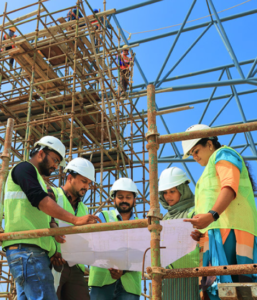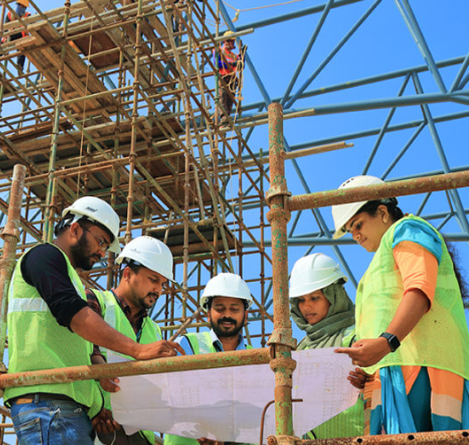Centenary of the Uralungal Labour Contract Co-Operative Society (ULCCS)

18 April 2024
On the occasion of the 100th anniversary of CICOPA Indian member the Uralungal Labour Contract Co-Operative Society (ULCCS), we sat with Kishor Kumar T K, Chief Project Coordinator at ULCCS.
CICOPA (C): Congratulation for this historic achievement! Can you tell us how everything started, and which needs prompted the creation of it?
Kishor Kumar (KK): ULCCS was formed in 1925 by the disciples of the eminent social reformer Sri Guru Vagbhatananda in a remote hamlet called Uralungal near Vatakara in Kozhikode District of Kerala. It was established as a mass movement against the anarchies of the caste system prevalent in those days. The organization grew from a response to a notification of the Malabar District Board under British rule, inviting people to form cooperatives in the Malabar region. This encouragement led 14 young people to form an organization that promoted equity and equality among its members. Over the years, ULCCS has become synonymous with quality, workmanship, precision, and efficiency in infrastructure projects, and it has grown into a diversified organization with international fame. The workers of the society, despite hailing from rural areas, use modern state-of-the-art technology in their activities, making ULCCS a successful example of how technology adoption at grassroots levels can bring about phenomenal changes in the lives of people in rural India.
C: How has ULCCS evolved in these 100 years and what are you most proud of?
KK: ULCCS has evolved significantly over the past 100 years. It was formed in 1925 as a cooperative society to promote equity and equality among its members, and it has grown into a diversified organization with international recognition.
The organization takes pride in several achievements. Firstly, it promotes gender equality by treating women and men equally, ensuring fair distribution of wages and work. Secondly, it fosters sustainable economic growth by providing employment opportunities to both genders and implementing welfare schemes to safeguard workers. Thirdly, it showcases innovative practices by revitalizing abandoned quarries into thriving economic hubs, supporting arts and crafts villages, and empowering unorganized workers in the handicraft sector. Additionally, the organization has garnered recognition and awards, including becoming a permanent member of the International Cooperative Alliance (ICA), receiving the ICA AP Excellence Award, and achieving the rank of world No.2 by the World Cooperative Monitor. Moreover, it has made a significant social impact by offering employment, implementing welfare schemes, supporting education and skill development, and advocating for human rights. Lastly, the organization demonstrates technological adaptability by successfully transitioning to digital payment systems post-demonetization in India, ensuring that its laborers navigate these changes seamlessly.
The organization is most proud of its commitment to quality, integrity, and efficiency in infrastructure projects, as well as its ability to overcome challenges and grow into a renowned and diversified organization.
C: The latest innovations in technologies must have had a critical impact on the infrastructure sector. Keeping this in mind, what are the main challenges that ULCCS had to overcome during the past years?
KK: ULCCS has faced several challenges in recent years, including cut-throat competition from private contractors, financial issues to meet large projects, and the sudden shift to the digital money system after demonetization in 2016. Additionally, the economic reforms in India in the early nineties created a crisis for local bodies, posing further challenges for ULCCS. However, the organization has overcome these challenges through the dedication and resilience of its members, who offered to reduce their wages and mobilize funds from their kith and kin to meet expenses.

C: How do you think ULCCS has impacted Indian society and economy for the better? KK: ULCCS has made a profound impact on Indian society, positively influencing the lives of 18,000 individuals in numerous ways:
Economic Empowerment: By fostering sustainable economic growth, ULCCS has provided employment opportunities for both men and women in rural India. Additionally, they’ve implemented various welfare schemes, including provident funds, insurance coverage, and financial aid for education and elderly members.
Gender Equality: At ULCCS, equality between genders is a core value. Women and men are treated fairly, with wages and work distributed equally whenever possible.
Social Development: ULCCS has uplifted vulnerable segments of society, enhancing access to essential resources and services. They’ve supported communities affected by conflicts and climate-related disasters, ensuring that laborers have access to food and backing education initiatives for underprivileged students, while also offering skill development programs.
Environmental Sustainability: With a commitment to environmental conservation, ULCCS has implemented initiatives like rainwater harvesting, waste-to-energy concepts, and the adoption of solar energy. These efforts contribute to cleaner water, improved sanitation, and accessible renewable energy sources.
Infrastructure Development: Expanding into various sectors such as IT, arts and crafts, education, agriculture, housing, and disaster management, ULCCS has created job opportunities and contributed to industry growth, innovation, and infrastructure development.
Reduced Inequality: ULCCS promotes equality by offering equal opportunities for all genders, thus contributing to the reduction of societal inequality.
Peace, Justice, and Strong Institutions: ULCCS maintains a peaceful and just work environment, promoting human rights and ensuring uninterrupted operations without any labor unrest.
C: How are you planning to celebrate this centenary?
KK: The ULCCS is celebrating its 100th anniversary with a centenary celebration that will last one year, from 13 February 2024 to 13 February 2025. The celebrations include various events such as a grand opening, cultural events, seminars on sustainable practices, and a visionary summit. The celebrations aim to bring together more than 1,000 distinguished guests and VIPs from social, scientific, and cultural backgrounds. In addition, a Centenary Family Gathering will be held in March, April, and May 2024, with art and music competitions, sporting events, and a celebration of retired members. The ULCCS will also honour its legacy through books, painting competitions, and souvenirs, as well as organising events by its branches, such as international craft awards, water tests, hackathons, and global performing arts festivals.
Thank you very much, Kishor! Our best wishes to the ULCCS for reaching this important milestone!

